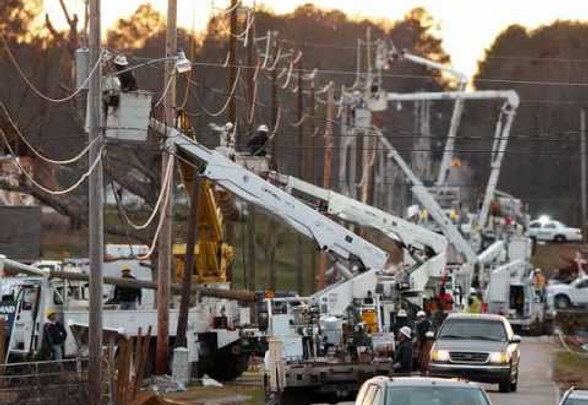
What do lineman get paid in 2026?
The median lineman salary in the United States is $81,760.
The demand for lineman has never been higher. However, all lineman are not paid the same. Where do lineman make the most money? What are the best lineman jobs with benefits near you?
Do lineman make good money?
Average Pay for Lineworkers
The median salary for lineman is $81,760 or around $40.00 an hour.
The four key areas that have significant impact of a lineworker's annual pay is:
-
Location
-
Storm Seasonality and number of overtime hours worked
-
Union or Non-Union Percentage in a specific location (and the local pay scale)
-
How insurance benefits (or lack there off) are compensated for in conjunction with lineman salary.
Some data you will see presented from the Bureau of Labor Statistics will show slightly lower average and median wages for the labor classification of "Line Installers and Line Repairers". One key reason for this is fiber optician technicians and fiber optic ground hands are included in this installation, maintenance and repair classification. The average salary of a fiber optic technician in 2026 is around $56,000. This report is focused specifically on transmission and distribution lineman doing overhead utility work.
Most lineman jobs are not paid salary rather are paid hourly. In most circumstances this can be to the benefit of the lineman working the job as there are notorious late nights and early mornings that can rack up some extra pay and overtime hours. However, as you consider a local lineman job that may be for a rural electric cooperative with a bit more predictable work load there can be some benefits of knowing you wont have much overtime pay but can budget for a consistent income.
Location: In what states do lineman make the most money?
In 2026, lineman in Hawaii will make the most money. Their average salary is $98,440.
The state with the lowest average pay for lineman is Mississippi coming in at $28.75 an hour.
We will first examine average lineman pay by the highest pay per hour and salary ranges. However, it is important to remember this may not translate to net take home pay.
For example, the average lineman in California makes $43.55 an hour or $1,742 per week while the average lineman in Nevada makes $40.77 an hour or $1,631 per week. Nevada does not have income tax. Lineman with permanent residence in Alaska, Florida, Nevada, South Dakota, Tennessee, Texas, Washington, and Wyoming do not pay income taxes.
This map breaks down by state the average annual wage for lineman.
2026 Lineman Hourly Pay by State
Considerations for your lineman pay and salary
How much do starting lineman make?
In 2026 the entry-level lineman with zero to five years of experience will earn an average yearly salary of $52,350. The bottom 10 percent made under $31,685, while the top 10 percent earned $85,250 or more.
To qualify for an lineman apprenticeship program and eventually a lineman apprentice job, the energy company or local utilities usually require the following:
-
That you have finished high school,
-
Reached 18 years of age, received a driver's license (CDL preferred)
-
Pass a drug test
If you meet these requirements, you apply to the company or program you want to work with, complete interviews and take aptitude/skill based tests.
Some programs, such an union lineman apprenticeships, work on a lottery system where you're put on a list to be chosen if your skills and background fit the program's needs and priorities (likely location based).
After you get accepted, you usually begin safety training and move on to classroom courses and field training as a first-year apprentice lineman.
The starting work for a lineman is ground hand work. While this work is low pay (less than $25/hr) it is an earn while you learn situation. This means you are logging paid hours on the way to become a journeyman lineman and get higher paying lineman jobs.
How the Lineman Pay Scale Works
When exploring lineman jobs and researching their pay and benefits you will likely come across a local pay scale. This is especially relevant for union lineman jobs.
Wage rates, also known as pay scales, help unions and line contractors set frameworks for how much to pay their linemen.
Here is an example from a local union (lineman jobs are classified in IBEW as Outside Construction):
They are arrange as an increasing table that displays an hourly rate (typically ranging from $10-80) with the corresponding lineman experience level (ranging from ground hand to foreman).
The starting work for a lineman is ground hand work. While this work is low pay (less than $25/hr) it is an earn while you learn situation. This means you are logging paid hours on the way to become a journeyman lineman and get higher paying lineman jobs.
Position | Hourly Rate |
|---|---|
General Foreman | $71.30 |
Foreman | $65.50 |
Journeyman Lineman | $59.25 |
Groundhand | $32.18 |
Lineman Job Considerations for Pay & Benefits
Many young lineman when they get their first lineman job forget to consider health insurance. Under the Affordable Care Act, you can stay until the age of 26 on your parents health insurance plan.
As a lineman on the job you get called to go out to a job for weeks or months then get laid off when project is complete or no longer needed then you sign the books again and wait for the next job, likely with a different company. This can be more consistent if you work for a specific utility or rural cooperative.
One way to get health insurance for you and your family out of pocket is the US Healthcare Marketplace. Healthcare.gov is the health insurance marketplace operated by the federal government. It launched in 2013 as part of the Affordable Care Act. The marketplace allows you compare and apply for private health insurance policies. Many linemen across the country have selected plans from providers such as Aetna, UnitedHealthCare, Coventry and Highmark.
Another strong option is the Line Construction Benefit Fund or LineCo. To participate you must be working for an employer under a collective bargaining agreement that contributes to LineCo.
You must work 125 hours a month to be eligible for benefits two months later.
Example, you work 200 hours this month they will take 125 out to 'pay' for your health insurance and the remaining 75 hours will go into your bank where you will continue to accrue hours anything over 125 a month.
LineCo partners with Blue Cross and Blue Shield for its network offerings.
What about retirement benefits for lineman jobs?
Compound interest is sometimes called the eighth wonder of the world.
A good simple tool to start a individual retirement account for linemen is Wealthfront. Using Wealthfront you can create an IRA or an Individual Retirement Account.
IRAs are retirement savings plans that offer tax incentives to individuals. Unlike a 401(k) plan, they are not setup by employers, giving individuals more flexibility and control over how their funds are managed.
If a 20 year old lineman puts $300 a month in an IRA for twenty five years they will likely have over $280,000 saved away from retirement (assuming an estimated interest rate of 8%).
Another potential option for lineman retirement benefits is the National Electrical Annuity Plan
Under this plan, you will receive a retirement benefit of 15% to 25% of your gross pay, depending on your local union. This amount is paid by the electrical contractors or local utilities and is not deducted from your paycheck as a lineman on the job.
Storm Work Impacts the Pay of Lineman Jobs
Some of the lineman jobs that pay the most money are storm recovery jobs.
Each year during hurricane and tropical storm season, as well as just general thunderstorms across the country powerlines are severely damaged. Storm work for lineman is high paying for lineman jobs for several reasons:
-
Utilities companies are in high demand as their customers are without power
-
Hourly pay is increased for both overtime work as well as travel time in some circumstances
-
Project bonuses are created for crews that work various hurricane and tropical storm transmission and distribution
There are several companies on the Lineman Central Career Center that for the most part only work/ chase storms.
You need to get in contact with them and get your name on the storm rosters. You want to be on these rosters before the storms hit because most of the time they take a set number of guys.
In some cases you may need to have an up to date union ticket if they are a union shop. They'll usually pay a couple days travel time and for your plane ticket. Sometimes the company youre working for will send a bunch of crews on storm and if you're one of them, great.. if not, drag up and go out with a company that chases storms.
The key to storm chasing jobs as a lineman is networking.
The more you chase storms, the more companies you'll get to know, the more you'll know who to call, etc.
As a lineman looking for work It's a great way to make money if you're single. You can still do it with a family but it will take its toll. It is not unheard of for lineman chasing storm jobs to make $13-14k a week.










